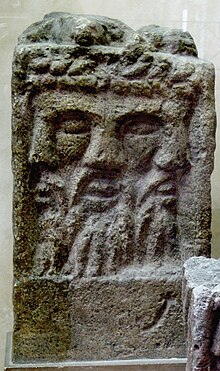| Lugh | |
|---|---|
God of Justice, war, kingship, craftsmen, skills, trade and harvests. | |
| Member of the Tuatha Dé Danann | |
 | |
| Other names | Lug, Lugus. |
| Abodes | |
| Weapons | |
| Animals | |
| Festivals | |
| Genealogy | |
| Parents | |
| Consorts | |
| Children |
|
| Equivalents | |
| Roman | Mercury |
Lugh or Lug (Old Irish: [l͈uɣ]; modern Irish: Lú [l̪ˠuː]) is a figure in Irish mythology. A member of the Tuatha Dé Danann, a group of supernatural beings, Lugh is portrayed as a warrior, a king, a master craftsman and a saviour.[1] He is associated with skill and mastery in multiple disciplines, including the arts.[2] Lugh also has associations with oaths, truth, and the law,[1] and therefore with rightful kingship.[3] Lugh is linked with the harvest festival of Lughnasadh, which bears his name. His most common epithets are Lámfada (Modern Irish: Lámhfhada [ˈl̪ˠaːw ad̪ˠə]; "long hand" or "long arm", possibly for his skill with a spear or his ability as a ruler) and Samildánach (Modern Irish: Samhaildánach [ˈsˠawəlʲ d̪ˠaːnˠəx]; "equally skilled in many arts").[4] This has sometimes been anglicised as "Lew of the Long Hand".[5][6]
In mythology, Lugh is the son of Cian and Ethniu (or Ethliu). He is the maternal grandson of the Fomorian tyrant Balor, whom Lugh kills in the Battle of Mag Tuired. Lugh's son is the hero Cú Chulainn, who is believed to be an incarnation of Lugh.
Lugh has several magical possessions. He wields an unstoppable fiery spear and a sling stone and owns a hound named Failinis. He is said to have invented fidchell, ball games, and horse racing.[4]
He corresponds to the pan-Celtic god Lugus, and his Welsh counterpart is Lleu Llaw Gyffes. He has also been equated with Mercury.
- ^ a b Olmsted, Garrett. The Gods of the Celts and the Indo-Europeans. University of Innsbruck, 1994. p.117
- ^ Monaghan, Patricia. The Encyclopedia of Celtic Mythology and Folklore. Infobase Publishing, 2004. pp.296-297
- ^ Koch, John T. Celtic Culture: A Historical Encyclopedia. ABC-CLIO, 2006. p.1200
- ^ a b Cite error: The named reference
ohogainwas invoked but never defined (see the help page). - ^ Brophy, Michael (1886). Sketches of the Royal Irish Constabulary. Burns and Oates. pp. 146, 158. Archived from the original on 16 September 2024. Retrieved 21 December 2023.
- ^ Burgh, Thomas J. De (14 February 2015). Ancient Naas. [Extracted from the Journal of the County Kildare Archaeological Society. ] - Scholar's Choice Edition. Creative Media Partners, LLC. ISBN 978-1-296-02343-0. Archived from the original on 16 September 2024. Retrieved 26 December 2023.